Rascals case in brief
In the beginning, in 1989, more than 90 children at the Little Rascals Day Care Center in Edenton, North Carolina, accused a total of 20 adults with 429 instances of sexual abuse over a three-year period. It may have all begun with one parent’s complaint about punishment given her child.
Among the alleged perpetrators: the sheriff and mayor. But prosecutors would charge only Robin Byrum, Darlene Harris, Elizabeth “Betsy” Kelly, Robert “Bob” Kelly, Willard Scott Privott, Shelley Stone and Dawn Wilson – the Edenton 7.
Along with sodomy and beatings, allegations included a baby killed with a handgun, a child being hung upside down from a tree and being set on fire and countless other fantastic incidents involving spaceships, hot air balloons, pirate ships and trained sharks.
By the time prosecutors dropped the last charges in 1997, Little Rascals had become North Carolina’s longest and most costly criminal trial. Prosecutors kept defendants jailed in hopes at least one would turn against their supposed co-conspirators. Remarkably, none did. Another shameful record: Five defendants had to wait longer to face their accusers in court than anyone else in North Carolina history.
Between 1991 and 1997, Ofra Bikel produced three extraordinary episodes on the Little Rascals case for the PBS series “Frontline.” Although “Innocence Lost” did not deter prosecutors, it exposed their tactics and fostered nationwide skepticism and dismay.
With each passing year, the absurdity of the Little Rascals charges has become more obvious. But no admission of error has ever come from prosecutors, police, interviewers or parents. This site is devoted to the issues raised by this case.
On Facebook
Click for earlier Facebook posts archived on this site
Click to go to
Today’s random selection from the Little Rascals Day Care archives….
Click for earlier Facebook posts archived on this site
Click to go to
Today’s random selection from the Little Rascals Day Care archives….
Convictions overturned, judge angrily exited
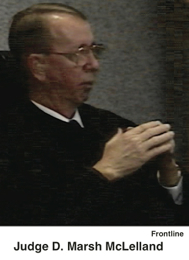 July 5, 2014
July 5, 2014
“The Burlington judge who has presided over the the Little Rascals Day Care Center case since 1990 resigned in disgust the day after the state Supreme Court refused to review (the overturning of) two convictions.
“D. Marsh McLelland, a retired Superior Court judge, said in a letter dated Sept. 8 that the court’s refusal to review the cases ‘is legally and morally reprehensible.’
“McLelland’s letter to Chief Justice Burley Mitchell said the refusal to review a Court of Appeals order for a new trial raised the term technicality to new heights….”
– From “Judge quits Little Rascals case” from the Associated Press (Sept. 22, 1995)
I imagine that the “technicality” comment was from a direct quote, although I haven’t been able to find either McLelland’s original letter or a more substantial account. It’s no wonder he felt humiliated – the Court of Appeals decision had laid bare his indifference to the rights of the defendants.
Regardless, McLelland’s resignation proved irrelevant, as prosecutors decided not to retry Bob Kelly and Dawn Wilson.
Prosecutor reneged on promise to Betsy Kelly
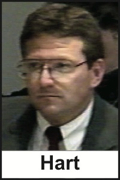 July 8, 2013
July 8, 2013
“As the parents made their case to the (North Carolina Parole Commission), prosecutors and defense attorneys continued sparring over whether the state had reneged on the plea bargain by trying to block (Betsy) Kelly’s parole.
“Kelly’s attorney, Joe Cheshire V, says prosecutor William Hart promised not to contest her parole if she agreed to the no-contest plea. Hart says the state never made such a pledge.
“Hart and assistant prosecutor Nancy Lamb attended the hearing to support the parents. They say it would be inappropriate for Kelly to be released, because she continues to publicly proclaim her innocence.
“ ‘The parents know she is guilty,’ Lamb told reporters before the hearing. ‘They know what their children have gone through.’
“Cheshire, continuing to maintain his client’s innocence, said Hart should have tried Kelly in court if he wanted to show she was guilty.
“ ‘He was afraid to do that,’ Cheshire said. ‘And now he’s running around saying that since she won’t admit her guilt, she should not get paroled. I think that’s pretty pathetic.’ ”
– From “Parents oppose parole for Little Rascals operator” in the News & Observer (April 12, 1994)
Pandering, bullying, grandstanding, double-crossing – in thwarting Betsy Kelly’s parole, the Little Rascals prosecutors scored a grand slam of misfeasance.
Here’s what Joe Cheshire recalls about that brutal day:
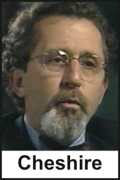 “Simply taking that plea was distasteful to me, but when the awesome power of government meshes with the awesome power of the judiciary and neither want to find the truth, but instead to consummate a decided outcome, the individual gets ground up in the process.
“Simply taking that plea was distasteful to me, but when the awesome power of government meshes with the awesome power of the judiciary and neither want to find the truth, but instead to consummate a decided outcome, the individual gets ground up in the process.
“Betsy was desperate to come home and did not trust anyone, nor should she have. I am not a fool; I would not have agreed to such a plea if it did not insure her freedom. The only (apparent) risk was the Parole Board. The prosecutor had agreed to not oppose her parole, but then he reneged. He knew that our only alternative was to move that the plea be set aside and that we would not be in a position to do that.
“Yes, in retrospect I should not have trusted him…. But he was not willing to put it in writing, and (insisting on that) would have ended the negotiations….”
Little Rascals prosecutors seemed perversely unable to let any defendant go home without administering a final cheap shot. When Scott Privott was released under a no-contest plea deal in 1994, they added a last-minute stipulation that he undergo psychiatric evaluation as part of his five-year probation.
“I saw them weekly for about two months,” Privott recalls, “and then they reported that I was normal. My probation officer told me (Bill) Hart was pissed… and that was that.”
Investigator still believes Kelly was guilty
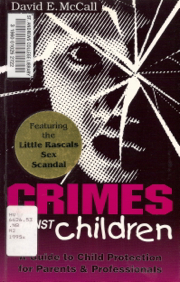 May 13, 2013
May 13, 2013
“On January 20, (1989, Audrey) Stever met with (social workers) David McCall and Grenda Costin, who told Ms. Stever that there was going to be an investigation into the day care. They also suggested to Ms. Stever that they put Kyle in therapy (and) that ‘they thought something was going on’ at the day care.
“On January 21, (Brenda) Toppin, Ms. Costin and Mr. McCall came to interview Kyle at his home. Ms. Stever prepared Kyle by telling him that he needed to be a ‘police helper’ to help figure out why the children at the day care were sad.”
– From brief for Bob Kelly before N.C. Court of Appeals (1994)
“As an initial social services investigator in the Robert Kelly case, I believe justice was served with this verdict…. A Salem-style witch-hunt did not occur, and a perpetrator of crimes against children was justly convicted. A significant battle in the war against child sexual abuse was fought and won in Edenton….”
–From “Crimes Against Children: A Guide to Child Protection for Parents and Professionals featuring the Little Rascals Day Care Sex Scandal” by David E. McCall (1995)
I asked McCall if he still believes justice was served in Little Rascals. “I stand on my original substantiation of abuse by Robert Kelly,” he said. “I was not involved in the investigation of the others charged.”
He said he went into the case with “significant training” in investigating abuse, adding that “If you ever want a child interviewed to find the truth, I really feel like I’m pretty good at that.”
McCall later left social work and now sells real estate in Edenton.
That’s our case, and we’re sticking to it (cont.)
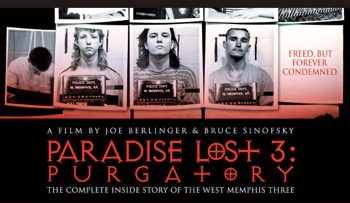 Feb. 1, 2012
Feb. 1, 2012
The HBO documentary “Paradise Lost 3: Purgatory” surely deserves its Oscar nomination, although the only edge it holds over Ofra Bikel’s “Innocence Lost” trilogy of the ’90s is its happy-tears finale: the three defendants walking out of prison.
After much lawyering, the West Memphis Three in August accepted an Alford plea that allowed them to go free, while protecting the state of Arkansas from a wrongful-imprisonment suit and the national embarrassment of a retrial.
I had to laugh at this exchange from the ensuing press conference:
Reporter: “Will the state continue to investigate this case if additional information is brought forth, or is the case closed?”
Prosecutor Scott Ellington: “I have no reason to believe there was anyone else involved in the homicides of these three children but the three defendants who pled guilty today.”
Defense attorney Dennis Riordon: “Does anyone believe that if the state had even the slightest continuing conviction they were guilty that it would have let these men go free today?”
If H.P. Williams Jr., Nancy Lamb and Bill Hart were watching – unlikely, given the spotlight shone on unjust prosecution – no doubt they would have admired Ellington’s resolve in the face of reality.











0 CommentsComment on Facebook